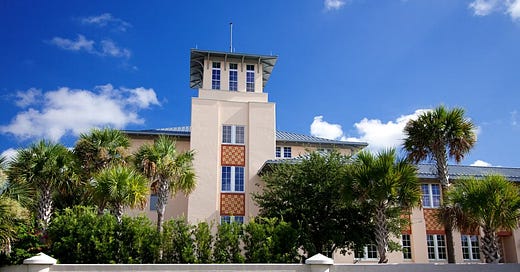How sports are aiding a hostile takeover of a Florida liberal arts college
Ron DeSantis wants New College of Florida to be a bastion of conservativism. To help do that, he started an athletic department with a 73-man baseball team
Ron DeSantis desperately wants to be President of the United States.
He won’t, of course, at least not in this election cycle. Earlier this week, he lost the Iowa caucuses to Republican frontrunner Donald Trump by 30 percentage points and in an average of national polls, he faces an even larger deficit of about 52 percentage points.
It’s a bit of a faceplant for someone who entered the race as a darling of the conservative movement, a younger-than-you-might-think politician often labeled as “Trump without the baggage” after spending the better part of his six years as Florida’s governor doing whatever he can to endear himself to Republican voters nationally.
Most of that work hasn’t addressed the most pressing issues affecting the daily lives of most of Florida’s citizens. The violent crime rate is higher in Miami and Orlando than it is in traditional right-wing media punching bags like San Francisco, New York, Seattle and Portland. It’s one of the 10 worst states in the country for housing affordability. A number of insurance companies are no longer providing home insurance coverage in the state.
Instead, DeSantis has focused primarily on something that takes much less work, but generates significantly more publicity – leaning into America’s ever-burning culture wars. He signed a law banning transgender girls and women from participating in middle school, high school and college athletic competitions. In 2022, he signed what’s commonly known as the “Don’t Say Gay” law that prohibits discussion of sexual orientation and gender identity in schools, which is now enforced all the way through 12th grade. When the Walt Disney Corporation, one of the state’s largest employers, offered a mild critique of the law, he waged an ill-fated war against it that landed him little beyond support from people he already had in his corner and a lawsuit Disney filed against him last year.
As his legislative record shows, DeSantis is not a particularly serious man, but as the chief executive of the country’s third-largest state, he’s a powerful one. His glaring lack of charisma and interpersonal skills, as well as a baffling inability to smile like a sentient human being, will prevent him from being inaugurated on the steps of the U.S. Capitol in Jan. 2025, but his fiefdom in Florida remains and as he has shown, he’s more than happy to exert his influence.
It’s an impulse that extends well beyond COVID-19 policies, drag shows and teachers who have the gall to acknowledge that romantic relationships don’t always involve a man and a woman.
Just take a look at one of Florida’s public colleges – and, specifically, its newly created athletic department.
What is New College? And what has happened to it?
The New College of Florida is a public liberal arts school of about 700 students nestled near the Sarasota Bay in Sarasota, Fla.
Described for years as “a community of free thinkers,” the school is something of an oddity.
New College was known and heralded for years as a place that nurtured academic independence, with students designing their own academic programs based on their interests and without a slew of prerequisites.
As journalist Jeb Lund, a former New College student, put it, the university is “a lot like grad school for undergrads.” Students have to complete a thesis to graduate. They don’t receive letter grades, but either pass or fail a course, with the professor providing them with a narrative evaluation of their performance. The average class size is only about 10 students.
That unorthodox setup had tangible benefits. For every 10 New College students who graduate, an average of nine go on to earn their doctorate.
The school became a haven for students who might have been marginalized elsewhere – those with disabilities, kids who were bullied and LGBTQ youth – but also welcomed students from across the ideological spectrum. Derek Black, the son of Don Black, the founder of the white supremacist website Storm Front, attended New College, where he went to do research on race and later renounced his views (which I suppose DeSantis would categorize as some kind of liberal indoctrination).
As DeSantis began his second term following a landslide reelection effort in 2022, he turned his attention to New College.
Last January, he removed six of the school’s 13 trustees and replaced them with conservative allies. That remade board then voted to oust the college’s president and install Richard Corcoran, DeSantis’ former education commissioner and a former Florida speaker of the house. Corcoran was approved for a salary that is double that of his predecessor and falls just short of what the president at Florida State, a school nearly 50 times the size of New College, earns.
DeSantis framed the moves as a way of providing support to what he saw as an ailing institution. New College, for all it offered, wasn’t without its problems. Since becoming independent in 2001 – it had previously been a part of the University of South Florida system – it was chronically underfunded. Enrollment had dipped. Facilities were outdated and, in a number of cases, dilapidated. Though the school was highly rated by outlets that rank colleges, it performed poorly in other metrics, like the number of graduates in high-demand majors or the percentage of alums making at least $30,000 a year.
What DeSantis saw as a fix, though, appeared more like a checklist of personal grievances. About 40% of the New College faculty was fired or resigned and replaced with “new professors aligned with the university’s mission.” The school’s diversity, equity, and inclusion programs were eliminated and New College’s top DEI official was fired. The gender studies department is in the process of being shuttered. Gender-neutral bathrooms have been removed. Student orientation leaders have been barred from wearing Black Lives Matter or Pride pins.
Among the trustees appointed by DeSantis was documentary filmmaker and conservative activist Christopher Rufo, who is perhaps best known for popularizing opposition to “critical race theory.” Critical race theory, or CRT as it’s commonly known, is a once-obscure approach to studying policies and institutions that is primarily taught in law schools, but through the work of Rufo and others, it has effectively become a catch-all for merely teaching about some of the more shameful aspects of America’s treatment of racial minorities. Rufo has said as much, tweeting in 2021 that “The goal is to have the public read something crazy in the newspaper and immediately think "critical race theory." We have decodified the term and will recodify it to annex the entire range of cultural constructions that are unpopular with Americans.”
DeSantis has spoken of his efforts at New College in lofty terms like wanting to offer a “classic liberal arts education” that teaches its students how to think rather than what to think. But much of what he publicly clamors for – diversity of thought, a lack of censorship and the freedom to discuss any topic – are things those around New College believed the school already had. If anything, it’s what defined it.
He had other plans, though. As DeSantis’ education commissioner put it, there was a desire to reshape New College in the image of Hillsdale College, a small Christian school in Michigan that has been an active presence in conservative politics for decades.
Naturally, there has been pushback to DeSantis’ actions. Last May, the New College faculty censured the school’s board, arguing it was "failing in their fiduciary duties of first: caring for the institution’s reputation and for student, faculty, and staff well-being;and second: endangering the College’s ability to fulfill its mission.” At its spring graduation last year, several students wore masks and turned their backs to the commencement speaker, former Trump advisor Scott Atlas.
Still, the college continued forward with its aggressive remodeling. DeSantis had promised $15 million for new faculty and scholarships. Corcoran has made it a mission to rapidly increase enrollment, offering admissions staff $5,000 bonuses if they reach the goal of enrolling at least 300 new students and dubbing the admissions department “Seal Team Six.”
There was one other thing, too.
On March 31 of last year, shortly after Corcoran met with the admissions staff to outline his ambitious enrollment dreams, New College had an announcement. It was launching an athletic department.
Keep reading with a 7-day free trial
Subscribe to The Front Porch to keep reading this post and get 7 days of free access to the full post archives.





